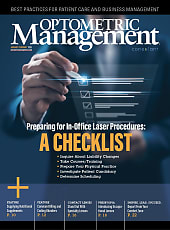
Nine out of 10 shoppers surveyed by Podium.com report they have made decisions based on online reviews. With that considered, ignoring what consumers say could hurt your business. So, what can you do to keep pace with what your patients might be saying about you?
Tracking + Talking
Start by checking out the platforms patients are likely to use, like Facebook, Google, and Yelp. There are a lot of tools and packages designed to help you track reviews on these and other sites. Google Alerts is probably the most frequently used.
If you want to dig deeper, there are a couple of tracking resource categories. Customer relationship management software packages are designed for specific business categories, and some include a live chat feature for your website. The other category, social monitoring tools, watches sites like Facebook for company mentions.
Rates, Tones + Strategies
According to reputation management company ReviewTrackers, 53% of customers expect a response to their online reviews within a week, but another third expect a reply within 24 to 72 hours.
As for the tone, never be defensive, and don’t remove negative reviews. Most important, you should always show that you are taking action. That doesn’t mean you can’t discuss the situation privately with the individual. In fact, you often should. Just make sure the resolution is online for others to see. Even better, ask the person to post after the issue has been resolved.
Two ECPs’ Solutions
Here’s how two eyecare professionals—EB editorial board member Eric White, OD, and Daniel Brunson, ABOC—handle online reviews. Owner of Complete Family Vision Care in San Diego, Dr. White has been practicing since 1985. Brunson is an optician and the fourth-generation owner of Hicks Brunson Eyewear in Tulsa. Both are very hands on when it comes to social media.
“I monitor all our online reviews,” says Brunson, most of which are from Google. “Ninety-nine percent of the reviews are positive, and I respond to all of them. I always thank the customer for leaving a review…and for trusting us with their eyewear needs.
“If they’re unhappy, I call them immediately. Most of the time, they go back and change it after we speak. Regardless, I leave negatives up. Either way, reviews are an intricate part of the practice.”

Dr. White has a two-step approach to managing reviews. “I monitor Yelp and Google regularly,” he says. “Also, at the end of each day, I send a personal email to every comprehensive exam patient [I saw that day]. In it, I ask them to rate me, and now [we] have more than 500 five-star reviews.” He uses EyecarePro to monitor the ratings. “I call it my virtual office manager. In addition, DrStars.com monitors my scores and, if there’s a negative one, sends me an alert before it’s posted.”
Dr. White handles most responses himself. “Doing this personally gives me the pulse on the practice. I’ve also given staff the latitude to respond and make decisions.”
The good news, Brunson adds, “is that if you have the right culture focused on pleasing customers, you will handle issues long before it gets to the point of a customer leaving a bad review.”
Why is it important to monitor and respond? Dr. White puts it this way: “With 600 optometrists in San Diego, social media helps you stand out.”



